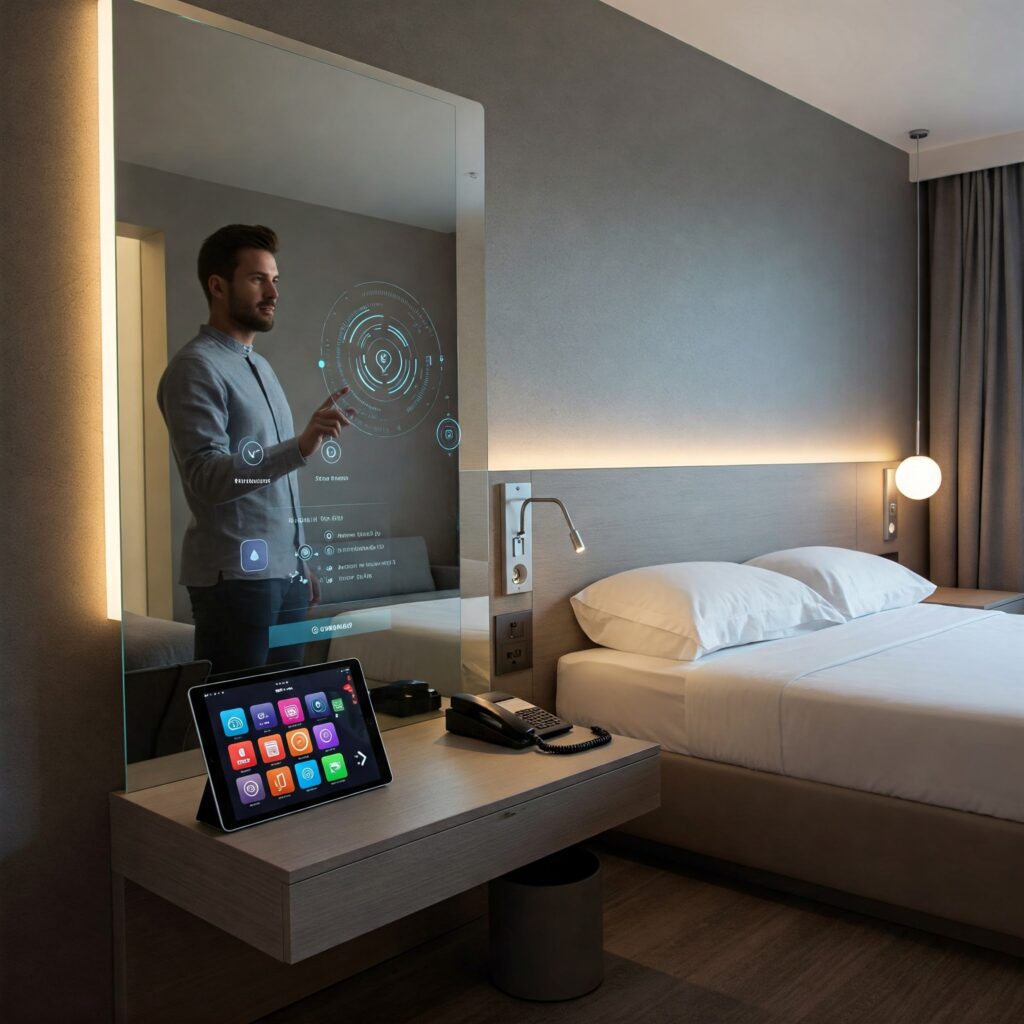
Technology has become an undeniable force shaping nearly every facet of modern life, and the hospitality industry is no exception. From the moment a guest books a room online to the instant they leave a digital review; technology plays a crucial role. However, this powerful tool presents a double-edged sword, offering incredible benefits while simultaneously introducing new challenges which could negatively impact the hospitality industry for years to come.
The Helping Hand of Technology:
Let’s first acknowledge the how technology has revolutionized the hospitality sector for the better:
- Seamless Booking and Check-in: Online travel agencies (OTAs), hotel websites, and mobile apps have made booking easier than ever. Contactless check-in and digital keys streamline arrival, saving time and enhancing convenience for guests. I do not know of anyone who will miss the long check in lines at hotels.
- Enhanced Guest Experience:
- Personalization: Data analytics allows hotels to understand guest preferences, offering tailored recommendations, room settings, and loyalty rewards. This possibility offers hotels many options to make a stay better but hotels have to actually deliver on this promise.
- In-Room Technology: Smart TVs, voice assistants, and connected devices enable guests to control their environment and access services with ease.
- Communication: Mobile apps and chatbots provide instant communication channels for guest inquiries, requests, and feedback, improving responsiveness.
- Operational Efficiency:
- Automation: Property Management Systems (PMS) automate tasks like reservations, billing, and housekeeping schedules, freeing up staff to focus on guest interactions.
- Inventory Management: Software solutions optimize purchasing and track inventory, reducing waste and costs in food and beverage operations.
- Energy Management: Smart thermostats and lighting systems help reduce energy consumption and lower operational expenses.
- Marketing and Revenue Management:
- Targeted Marketing: Digital platforms allow hotels to reach specific demographics with personalized advertising campaigns.
- Dynamic Pricing: Revenue management systems analyze market trends and demand to optimize pricing strategies, maximizing profitability.
- Addressing Labor Shortages: Automation in areas like check-in/out and even some service roles (like robotic food delivery in some instances) can help alleviate staffing challenges.
The Hurting Hand of Technology:
Despite these advancements, technology also presents significant drawbacks and challenges for the hospitality industry:
- The Impersonal Touch: Over-reliance on technology can lead to a decrease in genuine human interaction. While convenient, a completely automated experience can feel cold and transactional, potentially diminishing the core hospitality element.
- Movement to Transactional vs Relationship Contact: With a focus on efficiency and metrics like Net Promoter Scores (and other guest sentiment reviews measurements), the nature of service is changing. Service is becoming increasingly contact-light and optimized. Therefore the emphasis on efficiency and the digital experience often comes at the expense of the personal touch that defines great hospitality. This results in stays being transactional as opposed to a relationship built on connection.
- Data Privacy and Security Concerns: The collection and storage of vast amounts of guest data make hotels prime targets for cyberattacks. Data breaches can severely damage reputation and erode customer trust.
- The Rise of Online Travel Agencies (OTAs): While OTAs provide valuable booking platforms, they often charge significant commissions, impacting hotel profitability and potentially driving up prices for consumers.
- Keeping Up with Rapid Advancements: The pace of technological change is relentless. Hotels face the constant pressure to invest in new systems and train staff, which can be costly and time-consuming.
- Technical Issues and System Failures: Technology isn’t always reliable. System outages, software glitches, and connectivity problems can lead to significant disruptions, frustrating both staff and guests.
- The Digital Divide: Not all guests are equally comfortable with technology. Hotels must ensure they still cater to those who prefer more traditional methods of interaction and service.
- Increased Competition: Technology has lowered the barrier to entry for alternative accommodations like Airbnb, creating new competitive pressures for traditional hotels.
- Negative Online Reviews: While online reviews provide valuable feedback, they can also be easily manipulated or unfairly impact a hotel’s reputation, wielding significant power over potential guests.
Finding the Balance:
The key for the hospitality industry lies in finding the right balance. Technology should be embraced to enhance efficiency and convenience, but not at the expense of genuine human connection and personalized service. Hotels that can seamlessly integrate technology to empower their staff and elevate the guest experience, rather than replace human interaction entirely, will likely thrive in this evolving landscape.
If a hotel focuses on technology at the expense of human connection, it runs the risk of alienating the customer. The hospitality business thrived as it developed relationship and loyalty from its consumers. In fact, they built these loyalty programs based upon the premise that a customer benefits from its relationship and continued stays at its hotels. This resulted in growth at the hotels and benefits to the patrons. In fact, the loyalty programs have become one of the most valuable assets of certain hotel chains.
If you do not reinforce this relationship, then loyalty has not benefit and all the value accumulated overtime will decline quicker than it took to build it up.
Ultimately, technology is a tool. Its impact on the hospitality industry, whether helpful or hurtful, depends on how it is implemented and managed. The future of hospitality will likely be defined by those who can harness the power of technology while preserving the human touch that lies at the heart of creating memorable guest experiences.
